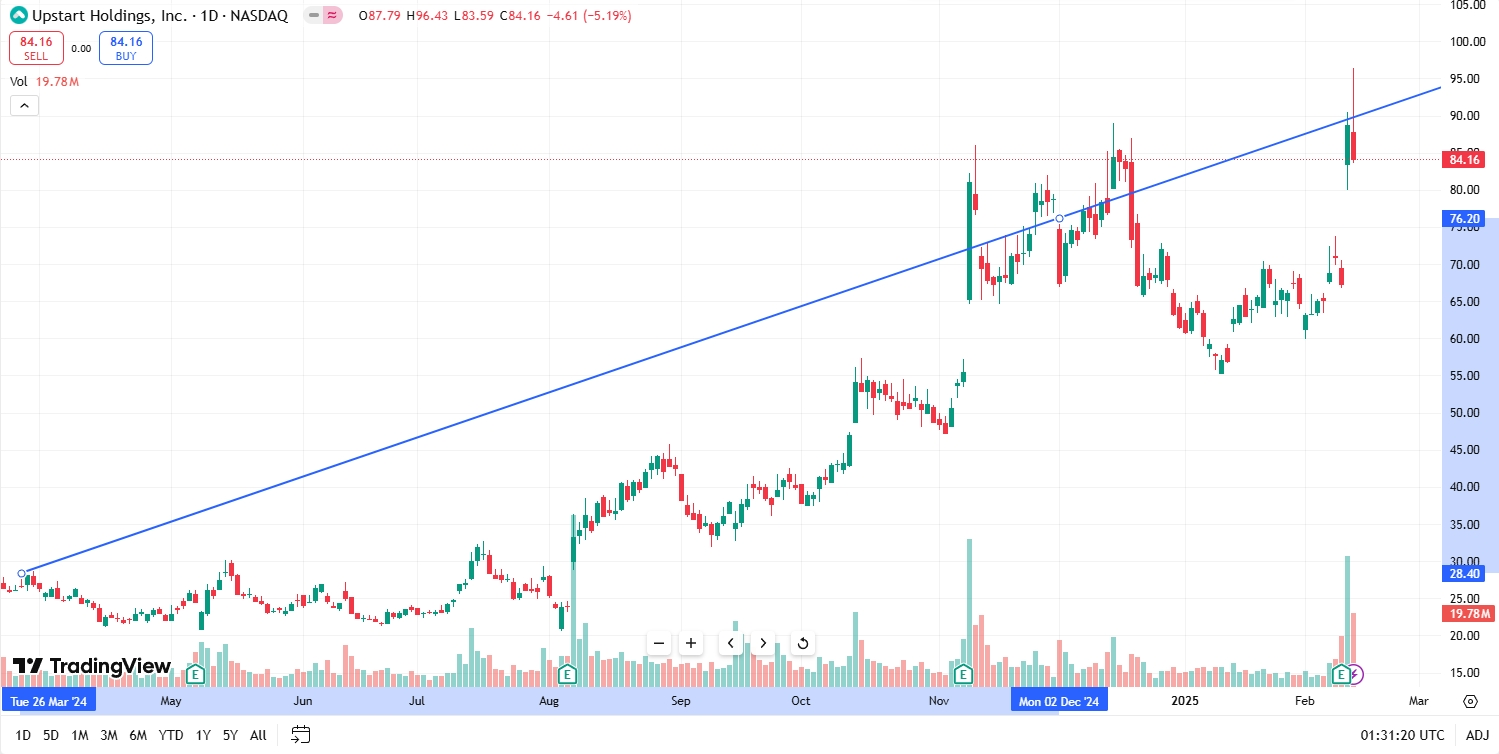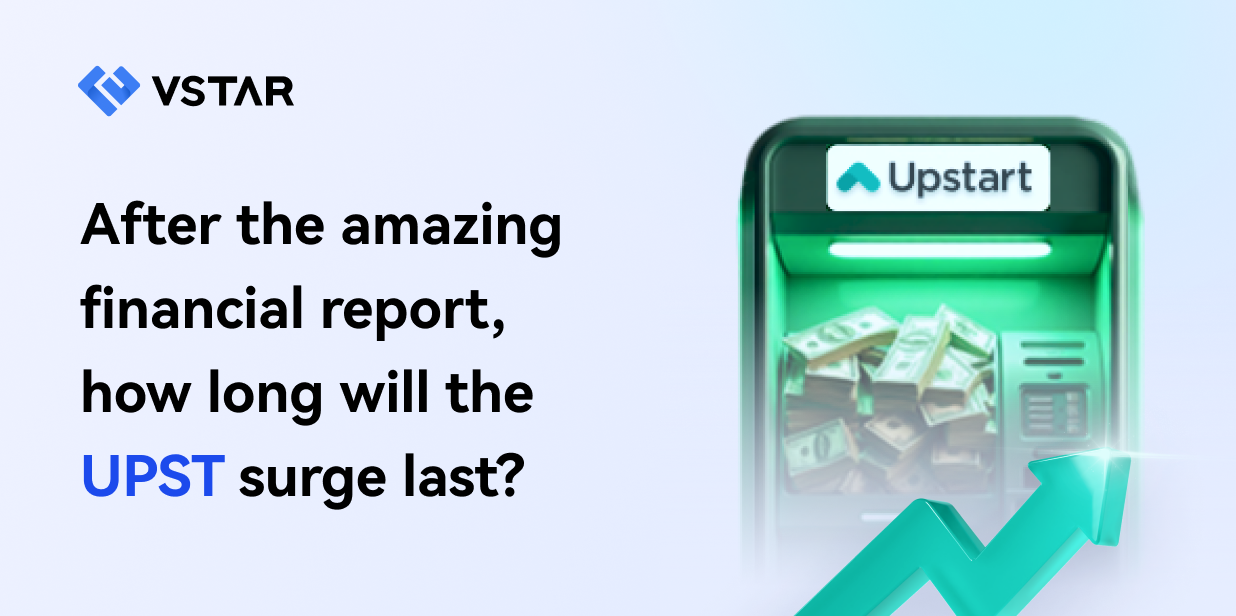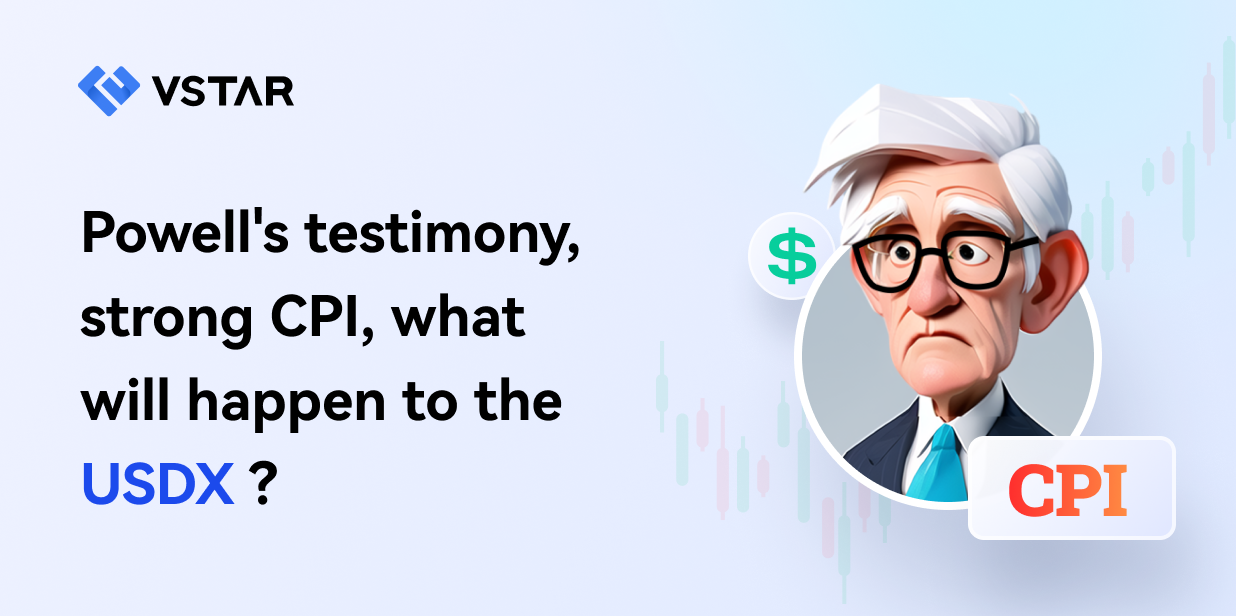Recently, Upstart Holdings (UPST) has released an amazing financial report, and its stock price has skyrocketed in just a few days, and the market is full of optimism about its future prospects. This wave of gains has made investors excited, but it also raises an important question: Can UPST's stock price continue to soar? In this analysis, we will explore in detail the reasons for Upstart's stock price surge and analyze whether it can continue to maintain its upward momentum in the future.
Amazing financial report: Highlights of performance that exceeded expectations
Upstart's recently released financial report is undoubtedly the direct reason for its stock price surge. According to the financial report data, Upstart's revenue and earnings have greatly exceeded market expectations, especially in terms of loan issuance volume and net profit, which have performed well.
Revenue growth: Upstart's revenue this quarter increased by more than 25%, significantly higher than analysts' expectations. Mainly due to the increase in transaction volume on its loan platform and more financial institutions have begun to adopt its AI technology for loan assessment
Profitability: The company has not only achieved revenue growth, but also significantly improved profitability. Net income and earnings per share (EPS) exceeded expectations, providing investors with a strong signal that its profit model is gradually maturing.
Loan demand growth: Upstart's loan platform continues to expand, especially in the areas of auto loans and small consumer loans, showing that the company not only has a place in the traditional personal loan market, but also has made breakthroughs in emerging markets.
These financial highlights have undoubtedly ignited investors' enthusiasm and driven the surge in stock prices. Upstart's profit growth, increased loan demand and potential for future expansion have become the core driving force behind the stock market reaction.
AI-driven advantages: growth engine
Upstart's core competitiveness lies in its artificial intelligence (AI)-driven credit assessment system. Unlike traditional banks that rely on fixed credit scoring models, Upstart uses machine learning and big data analysis to assess borrowers' credit risks, which enables it to provide loans to a wider range of customer groups and reduce default rates without sacrificing credit quality.
This technological advantage not only allows Upstart to stand out in the traditional credit market, but also provides a strong driving force for its entry into new loan markets (such as auto loans, education loans, etc.). As AI technology continues to mature and optimize, Upstart's credit platform is performing better and better in improving loan approval efficiency and reducing risks, which makes it unique in the fintech industry.
If Upstart can continue to innovate and expand the scope of its AI technology, especially in cross-border expansion and product diversification, it will have a larger market space and may continue to drive stock prices up.
Macroeconomic environment: interest rates and market sentiment
The macroeconomic environment is an important external factor affecting Upstart's stock price. Although the company's fundamentals are strong, its future stock price performance will still be affected by economic cycles and interest rate policies.
Impact of interest rate changes: Upstart's loan business is sensitive to interest rate changes. If the Federal Reserve raises interest rates, the cost of borrowing will rise, which may lead to a decline in loan demand, which may put pressure on Upstart's loan platform business. However, although the Federal Reserve may continue to raise interest rates in recent years, interest rates are not expected to fluctuate sharply, so the impact on Upstart in the short term is relatively limited.
Economic recovery and consumer confidence: The current US economic recovery is strong, the unemployment rate is low, and consumer confidence has recovered, which provides strong support for loan demand. As an AI-based lending platform, Upstart has benefited from this environment, especially in the consumer and auto loan sectors.
Fluctuations in market sentiment: Like most technology stocks, Upstart's stock price is susceptible to market sentiment. Especially when investment enthusiasm in the fintech industry is high, investors are confident in Upstart's future and the stock price may be pushed up. However, market sentiment may also change under unfavorable economic data or policy changes, resulting in sharp fluctuations in stock prices.
Conclusion: Although the macroeconomic environment may pose certain risks to Upstart, interest rates and market sentiment have relatively little negative impact on its stock price in the current economic context.
Competitive pressure: Can it maintain its dominant position?
Although Upstart is a leader in the field of AI-driven credit assessment, with the development of the fintech industry, competitive pressure is also increasing. Companies such as LendingClub and SoFi are also increasing their investment in AI technology to compete for market share in the fintech field. In addition, traditional banks and lenders are also accelerating digital transformation and launching their own loan platforms, which makes Upstart face increasingly fierce market competition.
Whether Upstart can continue to maintain its advantage in this fierce competition will directly affect the long-term trend of its stock price. If the company can continue to launch new technological innovations and make breakthroughs in market expansion, it still has a great chance to maintain its leading position. But if competitors can keep up with technological advances and narrow the gap, Upstart may face market share squeeze.
Conclusion: Increased competitive pressure may affect Upstart's market share, and thus the long-term upside potential of its stock price. However, if the company can continue to maintain technological innovation and market expansion, it still has a chance to stay ahead.
Short-term hype and long-term value: stock price volatility risk
It is worth noting that investor sentiment and market hype are also important factors affecting Upstart's stock price. Although the company's financial report and technological advantages provide support for the stock price, the stock market is highly volatile in the short term. The prospects of the fintech industry are optimistic among investors, which may drive the stock price to rise rapidly. However, short-term stock price fluctuations may also increase with changes in market sentiment.
For investors, although Upstart has strong long-term growth potential, the stock price is more volatile in the short term, especially when market sentiment fluctuates or the company fails to deliver on its promises in a timely manner, the stock price may experience a correction.
Conclusion: In the short term, due to market hype and emotional fluctuations, the stock price may continue to fluctuate, and investors should be cautious about short-term gains.
Comprehensive analysis: Will UPST continue to soar?

Conclusion: Upstart's stock price soared after the recent financial report, mainly benefiting from its strong performance and competitive advantages in AI technology. If the company continues to maintain technological innovation and market expansion, the stock price still has the potential to rise in the future. Especially in AI credit assessment, cross-border expansion and new product launches, Upstart is expected to continue to attract investors' attention.
However, investors should also be wary of the following risk factors:
Competitive pressure: Intensified competition from other fintech companies and traditional financial institutions in the industry may affect Upstart's market share.
Macroeconomic changes: Rising interest rates and fluctuations in the economic cycle may have an impact on loan demand.
Short-term volatility: Changes in market sentiment and investor sentiment may cause stock price fluctuations.
*Disclaimer: The content of this article is for learning purposes only and does not represent the official position of VSTAR, nor can it be used as investment advice.



